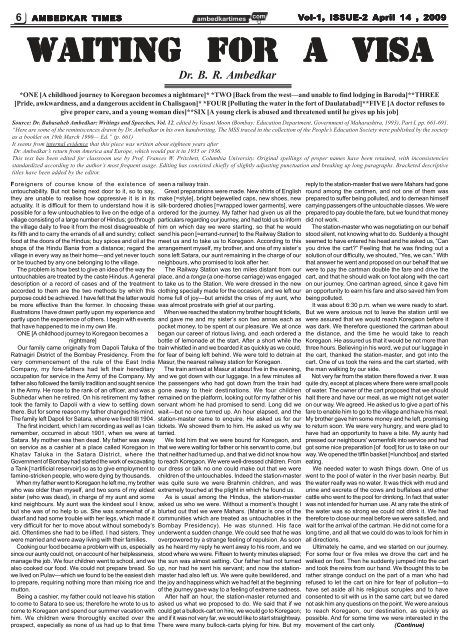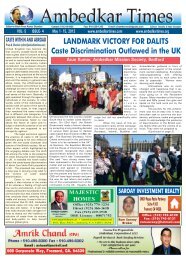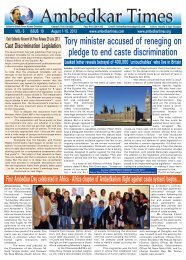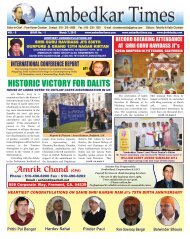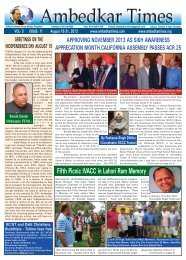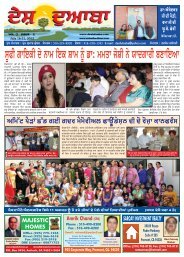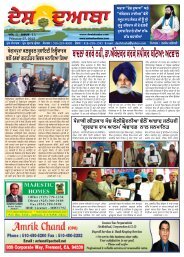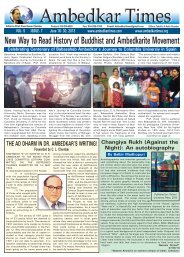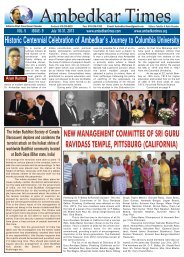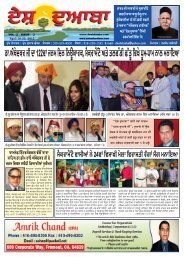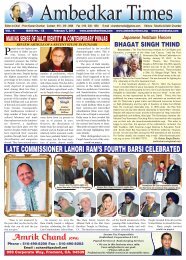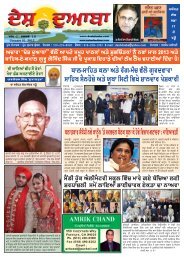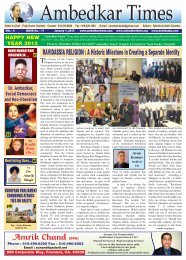ambedkar times news paper april 14, 2009 - Ambedkartimes.com
ambedkar times news paper april 14, 2009 - Ambedkartimes.com
ambedkar times news paper april 14, 2009 - Ambedkartimes.com
You also want an ePaper? Increase the reach of your titles
YUMPU automatically turns print PDFs into web optimized ePapers that Google loves.
6<br />
AMBEDKAR AMBEDKAR TIMES TIMES<br />
Vol-1, ol-1, ISSUE-2 ISSUE-2 April pril <strong>14</strong> <strong>14</strong> , , <strong>2009</strong><br />
<strong>2009</strong><br />
WAITING WAITING FOR FOR A A VISA<br />
VISA<br />
Foreigners of course know of the existence of<br />
untouchability. But not being next door to it, so to say,<br />
they are unable to realise how oppressive it is in its<br />
actuality. It is difficult for them to understand how it is<br />
possible for a few untouchables to live on the edge of a<br />
village consisting of a large number of Hindus; go through<br />
the village daily to free it from the most disagreeable of<br />
its filth and to carry the errands of all and sundry; collect<br />
food at the doors of the Hindus; buy spices and oil at the<br />
shops of the Hindu Bania from a distance; regard the<br />
village in every way as their home—and yet never touch<br />
or be touched by any one belonging to the village.<br />
The problem is how best to give an idea of the way the<br />
untouchables are treated by the caste Hindus. A general<br />
description or a record of cases and of the treatment<br />
accorded to them are the two methods by which this<br />
purpose could be achieved. I have felt that the latter would<br />
be more effective than the former. In choosing these<br />
illustrations I have drawn partly upon my experience and<br />
partly upon the experience of others. I begin with events<br />
that have happened to me in my own life.<br />
ONE [A childhood journey to Koregaon be<strong>com</strong>es a<br />
nightmare]<br />
Our family came originally from Dapoli Taluka of the<br />
Ratnagiri District of the Bombay Presidency. From the<br />
very <strong>com</strong>mencement of the rule of the East India<br />
Company, my fore-fathers had left their hereditary<br />
occupation for service in the Army of the Company. My<br />
father also followed the family tradition and sought service<br />
in the Army. He rose to the rank of an officer, and was a<br />
Subhedar when he retired. On his retirement my father<br />
took the family to Dapoli with a view to settling down<br />
there. But for some reason my father changed his mind.<br />
The family left Dapoli for Satara, where we lived till 1904.<br />
The first incident, which I am recording as well as I can<br />
remember, occurred in about 1901, when we were at<br />
Satara. My mother was then dead. My father was away<br />
on service as a cashier at a place called Koregaon in<br />
Khatav Taluka in the Satara District, where the<br />
Government of Bombay had started the work of excavating<br />
a Tank [=artificial reservoir] so as to give employment to<br />
famine-stricken people, who were dying by thousands.<br />
When my father went to Koregaon he left me, my brother<br />
who was older than myself, and two sons of my eldest<br />
sister (who was dead), in charge of my aunt and some<br />
kind neighbours. My aunt was the kindest soul I know,<br />
but she was of no help to us. She was somewhat of a<br />
dwarf and had some trouble with her legs, which made it<br />
very difficult for her to move about without somebody’s<br />
aid. Often<strong>times</strong> she had to be lifted. I had sisters. They<br />
were married and were away living with their families.<br />
Cooking our food became a problem with us, especially<br />
since our aunty could not, on account of her helplessness,<br />
manage the job. We four children went to school, and we<br />
also cooked our food. We could not prepare bread. So<br />
we lived on Pulav—which we found to be the easiest dish<br />
to prepare, requiring nothing more than mixing rice and<br />
mutton.<br />
Being a cashier, my father could not leave his station<br />
to <strong>com</strong>e to Satara to see us; therefore he wrote to us to<br />
<strong>com</strong>e to Koregaon and spend our summer vacation with<br />
him. We children were thoroughly excited over the<br />
prospect, especially as none of us had up to that time<br />
Dr. B. R. Ambedkar<br />
*ONE [A childhood journey to Koregaon be<strong>com</strong>es a nightmare]* *TWO [Back from the west—and unable to find lodging in Baroda]**THREE<br />
[Pride, awkwardness, and a dangerous accident in Chalisgaon]* *FOUR [Polluting the water in the fort of Daulatabad]**FIVE [A doctor refuses to<br />
give proper care, and a young woman dies]**SIX [A young clerk is abused and threatened until he gives up his job]<br />
Source: Dr. Babasaheb Ambedkar: Writings and Speeches, Vol. 12, edited by Vasant Moon (Bombay: Education Department, Government of Maharashtra, 1993), Part I, pp. 661-691.<br />
“Here are some of the reminiscences drawn by Dr. Ambedkar in his own handwriting. The MSS traced in the collection of the People’s Education Society were published by the society<br />
as a booklet on 19th March 1990— Ed.” (p. 661)<br />
It seems from internal evidence that this piece was written about eighteen years after<br />
Dr. Ambedkar’s return from America and Europe, which would put it in 1935 or 1936.<br />
This text has been edited for classroom use by Prof. Frances W. Pritchett, Columbia University. Original spellings of proper names have been retained, with inconsistencies<br />
standardized according to the author’s most frequent usage. Editing has consisted chiefly of slightly adjusting punctuation and breaking up long paragraphs. Bracketed descriptive<br />
titles have been added by the editor.<br />
seen a railway train.<br />
Great preparations were made. New shirts of English<br />
make [=style], bright bejewelled caps, new shoes, new<br />
silk-bordered dhoties [=wrapped lower garments], were<br />
ordered for the journey. My father had given us all the<br />
particulars regarding our journey, and had told us to inform<br />
him on which day we were starting, so that he would<br />
send his peon [=errand-runner] to the Railway Station to<br />
meet us and to take us to Koregaon. According to this<br />
arrangement myself, my brother, and one of my sister’s<br />
sons left Satara, our aunt remaining in the charge of our<br />
neighbours, who promised to look after her.<br />
The Railway Station was ten miles distant from our<br />
place, and a tonga (a one-horse carriage) was engaged<br />
to take us to the Station. We were dressed in the new<br />
clothing specially made for the occasion, and we left our<br />
home full of joy—but amidst the cries of my aunt, who<br />
was almost prostrate with grief at our parting.<br />
When we reached the station my brother bought tickets,<br />
and gave me and my sister’s son two annas each as<br />
pocket money, to be spent at our pleasure. We at once<br />
began our career of riotous living, and .each ordered a<br />
bottle of lemonade at the start. After a short while the<br />
train whistled in and we boarded it as quickly as we could,<br />
for fear of being left behind. We were told to detrain at<br />
Masur, the nearest railway station for Koregaon.<br />
The train arrived at Masur at about five in the evening,<br />
and we got down with our luggage. In a few minutes all<br />
the passengers who had got down from the train had<br />
gone away to their destinations. We four children<br />
remained on the platform, looking out for my father or his<br />
servant whom he had promised to send. Long did we<br />
wait—but no one turned up. An hour elapsed, and the<br />
station-master came to enquire. He asked us for our<br />
tickets. We showed them to him. He asked us why we<br />
tarried.<br />
We told him that we were bound for Koregaon, and<br />
that we were waiting for father or his servant to <strong>com</strong>e, but<br />
that neither had turned up, and that we did not know how<br />
to reach Koregaon. We were well-dressed children. From<br />
our dress or talk no one could make out that we were<br />
children of the untouchables. Indeed the station-master<br />
was quite sure we were Brahmin children, and was<br />
extremely touched at the plight in which he found us.<br />
As is usual among the Hindus, the station-master<br />
asked us who we were. Without a moment’s thought I<br />
blurted out that we were Mahars. (Mahar is one of the<br />
<strong>com</strong>munities which are treated as untouchables in the<br />
Bombay Presidency). He was stunned. His face<br />
underwent a sudden change. We could see that he was<br />
overpowered by a strange feeling of repulsion. As soon<br />
as he heard my reply he went away to his room, and we<br />
stood where we were. Fifteen to twenty minutes elapsed;<br />
the sun was almost setting. Our father had not turned<br />
up, nor had he sent his servant; and now the stationmaster<br />
had also left us. We were quite bewildered, and<br />
the joy and happiness which we had felt at the beginning<br />
of the journey gave way to a feeling of extreme sadness.<br />
After half an hour, the station-master returned and<br />
asked us what we proposed to do. We said that if we<br />
could get a bullock-cart on hire, we would go to Koregaon;<br />
and if it was not very far, we would like to start straightway.<br />
There were many bullock-carts plying for hire. But my<br />
reply to the station-master that we were Mahars had gone<br />
round among the cartmen, and not one of them was<br />
prepared to suffer being polluted, and to demean himself<br />
carrying passengers of the untouchable classes. We were<br />
prepared to pay double the fare, but we found that money<br />
did not work.<br />
The station-master who was negotiating on our behalf<br />
stood silent, not knowing what to do. Suddenly a thought<br />
seemed to have entered his head and he asked us, “Can<br />
you drive the cart?” Feeling that he was finding out a<br />
solution of our difficulty, we shouted, “Yes, we can.” With<br />
that answer he went and proposed on our behalf that we<br />
were to pay the cartman double the fare and drive the<br />
cart, and that he should walk on foot along with the cart<br />
on our journey. One cartman agreed, since it gave him<br />
an opportunity to earn his fare and also saved him from<br />
being polluted.<br />
It was about 6:30 p.m. when we were ready to start.<br />
But we were anxious not to leave the station until we<br />
were assured that we would reach Koregaon before it<br />
was dark. We therefore questioned the cartman about<br />
the distance, and the time he would take to reach<br />
Koregaon. He assured us that it would be not more than<br />
three hours. Believing in his word, we put our luggage in<br />
the cart, thanked the station-master, and got into the<br />
cart. One of us took the reins and the cart started, with<br />
the man walking by our side.<br />
Not very far from the station there flowed a river. It was<br />
quite dry, except at places where there were small pools<br />
of water. The owner of the cart proposed that we should<br />
halt there and have our meal, as we might not get water<br />
on our way. We agreed. He asked us to give a part of his<br />
fare to enable him to go to the village and have his meal.<br />
My brother gave him some money and he left, promising<br />
to return soon. We were very hungry, and were glad to<br />
have had an opportunity to have a bite. My aunty had<br />
pressed our neighbours’ womenfolk into service and had<br />
got some nice preparation [of food] for us to take on our<br />
way. We opened the tiffin basket [=lunchbox] and started<br />
eating.<br />
We needed water to wash things down. One of us<br />
went to the pool of water in the river basin nearby. But<br />
the water really was no water. It was thick with mud and<br />
urine and excreta of the cows and buffaloes and other<br />
cattle who went to the pool for drinking. In fact that water<br />
was not intended for human use. At any rate the stink of<br />
the water was so strong we could not drink it. We had<br />
therefore to close our meal before we were satisfied, and<br />
wait for the arrival of the cartman. He did not <strong>com</strong>e for a<br />
long time, and all that we could do was to look for him in<br />
all directions.<br />
Ultimately he came, and we started on our journey.<br />
For some four or five miles we drove the cart and he<br />
walked on foot. Then he suddenly jumped into the cart<br />
and took the reins from our hand. We thought this to be<br />
rather strange conduct on the part of a man who had<br />
refused to let the cart on hire for fear of pollution—to<br />
have set aside all his religious scruples and to have<br />
consented to sit with us in the same cart; but we dared<br />
not ask him any questions on the point. We were anxious<br />
to reach Koregaon, our destination, as quickly as<br />
possible. And for some time we were interested in the<br />
movement of the cart only. (Continue)


